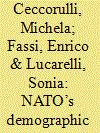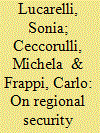|
|
|
Sort Order |
|
|
|
Items / Page
|
|
|
|
|
|
|
| Srl | Item |
| 1 |
ID:
101005


|
|
|
|
|
| Publication |
2010.
|
| Summary/Abstract |
The central aim of this article is to discuss the question of how we can understand and explain the European Union (EU) as a security actor - in essence, to elaborate on the current literature on security governance in order to provide a more theoretically driven analysis of the EU in security. Our contention is that whilst the current literature on security governance in Europe is conceptually rich, there still remains somewhat of a gap between those that do 'security governance' and those that focus on 'security' per se. We argue that a synergy or at least a conversation between these two literatures is required in order to enrich further the study of the EU as global-regional security actor.
|
|
|
|
|
|
|
|
|
|
|
|
|
|
|
|
| 2 |
ID:
154839


|
|
|
|
|
| Summary/Abstract |
Migration did not figure in the European Security Strategy of 2003. Never mentioned as a threat, it was not even mentioned as a risk. Thirteen years later, migration is widely cited in the new European Union Global Strategy. Much richer than the previous security document and global in aspiration, the Global Strategy treats migration as a challenge and an opportunity, recognising the key role it plays in a rapidly changing security landscape. However, this multi-faceted perspective on migration uncovers starkly different political and normative claims, all of which are legitimate in principle. The different narratives on migration present in the new strategic document attest to the Union’s comprehensive approach to the issue but also to critical and possibly competing normative dilemmas.
|
|
|
|
|
|
|
|
|
|
|
|
|
|
|
|
| 3 |
ID:
156247


|
|
|
|
|
| Summary/Abstract |
Russia, cyberterrorism, Da’esh are among the most quoted challenges to NATO mentioned in the organizations’ documents, specialized literature and newspaper articles. How about a subtler, less striking but real challenge like demographic change? Demographic trends are increasingly recognized as relevant in understanding international politics and particularly international security, but only seldom taken into consideration when dealing with NATO’s future challenges. NATO, hence, suffers from the limits of a political–military institution designed for a post-Second World War demographic and security context that is changing drastically – and is expected to change even more in the foreseeable future. The aim of this article is to explore the current and projected demographic trends at the global level, evaluate their security implications and then draw inferences for the challenges and opportunities that will arise for NATO out of the sketched scenarios. Based on this analysis, we posit that the Alliance is facing a demographic paradox, whereby it is increasingly unable to cope with external demographic challenges because internal demographic changes are weakening the cohesion needed to provide an effective response.
|
|
|
|
|
|
|
|
|
|
|
|
|
|
|
|
| 4 |
ID:
151390


|
|
|
|
|
| Summary/Abstract |
Already introduced to the academic and political debate some years ago, the concept of “security governance” still needs to be clarified. In particular, four main shortcomings need to be overcome to make the concept more useful for an assessment of current security dynamics: in the first place, attention has been devoted more to “governance” than to “security”, while failing to consider the role of the understandings and perceptions of the actors involved in the governance system. Second, the literature on the actors (governmental or not) involved is still fragmented. Third, the literature on security governance has too often been detached from reflections on regionalism, while it would be useful to further explore the relationship between cognitive definitions of regional and security dynamics. Fourth, the literature has predominantly focused on Europe and the transatlantic area, overlooking processes of “region-building” in security terms in other “unexpected” geographical spaces. After proposing avenues to overcome the current gaps in the literature, the Southern Caucasus is chosen as a case study to show the different instances of security governance emerging, thanks to definitions of the region in security terms that have involved regional and external actors, of a state and non-state nature.
|
|
|
|
|
|
|
|
|
|
|
|
|
|
|
|
| 5 |
ID:
168604


|
|
|
|
|
| Summary/Abstract |
In the last few years, migration has been at the centre of attention of the European public and policymakers, sparking an unprecedented debate on responsibilities and rights. This Special Issue presents a collection of European case studies analysing narratives of migration and their embedded justice claims. It focuses on the way national newspapers have covered and discussed key political events related to European politics and migration dynamics between 2014 and 2018. The results reveal an increasing normalisation of extreme and anti-immigrant claims in all cases. The only rather frequent counter-narrative is ‘humanitarian’, yet, it predominantly depicts migrants as victims, hence denying their subjectivity and actorness. There is an important correlation between the debates on migration and the European Union, as the so-called ‘crisis’ has strengthened the political debate on the EU in European countries. All in all, the dominant narratives on migration embed a Westphalian understanding of justice (justice as non-domination), while little attention is devoted to cosmopolitan justice claims (justice ad impartiality) and, much less, to ‘subjectivised cosmopolitan justice claims’ (justice as mutual recognition).
|
|
|
|
|
|
|
|
|
|
|
|
|
|
|
|
| 6 |
ID:
071750


|
|
|
|
|
| Publication |
London, Routledge, 2006.
|
| Description |
xvi, 254p.
|
| Series |
Routledge advances in European politics
|
| Standard Number |
0415371368
|
|
|
|
|
|
|
|
|
|
|
|
Copies: C:1/I:0,R:0,Q:0
Circulation
| Accession# | Call# | Current Location | Status | Policy | Location |
| 051237 | 327.4/LUC 051237 | Main | On Shelf | General | |
|
|
|
|
|
|
|
|
|